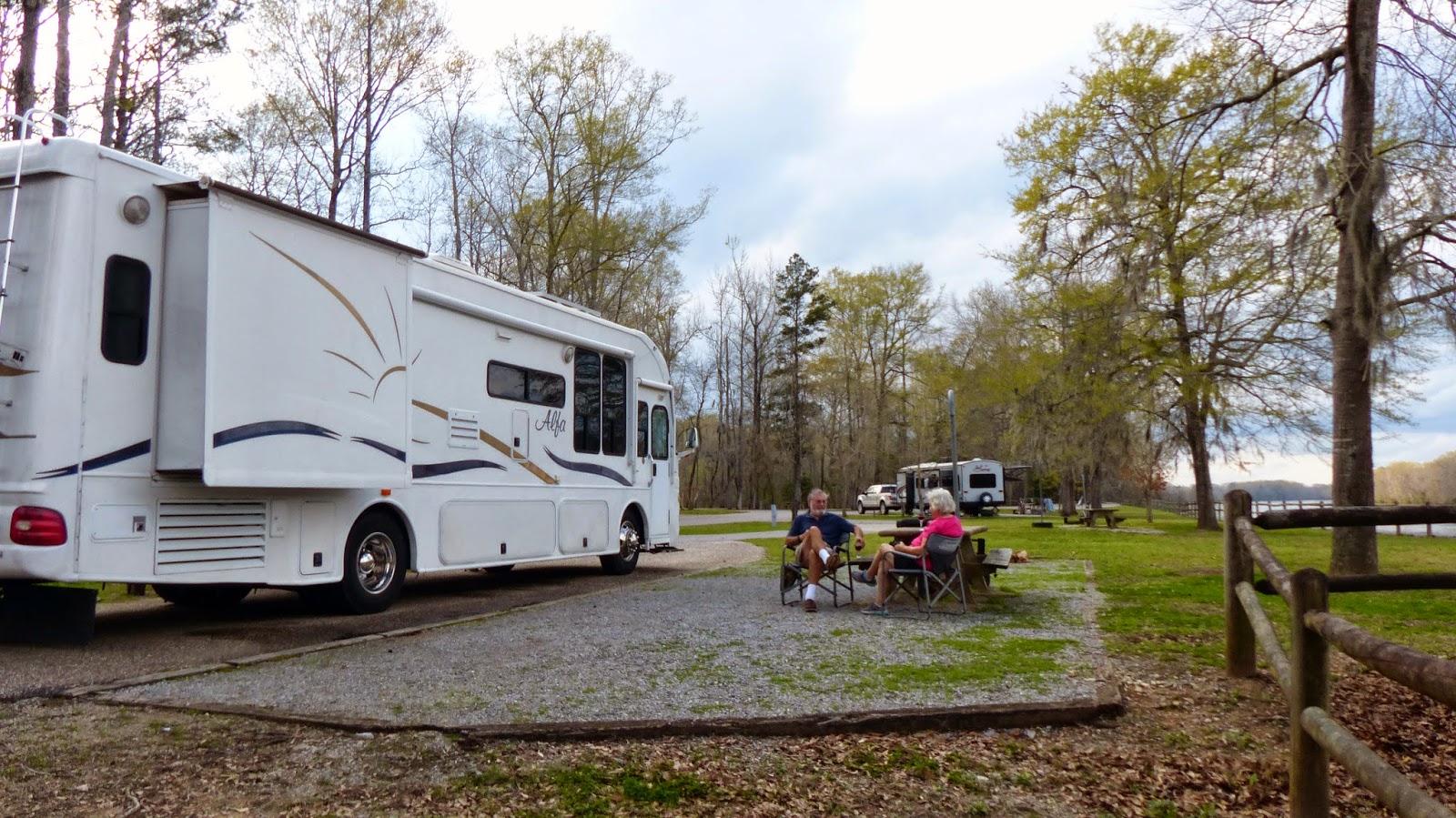 |
| Living large. A glass of wine on the banks of the Tombigbee River in Alabama |
Robert Frost, the Vermont poet, wrote:
“Two
roads diverged in a wood, and I –
I
took the one less traveled by,
And
that has made all the difference.”
We did the same when we came to Tallahassee, the
capital of Florida. We still were on the interstate which travels east-to-west
across the top of Florida. It is a real eye-opener every time we’ve taken this
road. When you leave Interstate 75 and take I-10, the mileage marker informs
you that Pensacola, on Florida’s western tip of the panhandle, is 300 miles
away. We had stopped in Tallahassee in a Walmart parking lot. Now we were ready
to edge our way off the interstate and cross into Alabama.
The time change to Central Time also throws the
traveler off on this stretch of road. But then Frost’s words settled into my
consciousness and we began to feel the difference. Alabama is beautiful at this
moment in the spring. Redbud trees are in full bloom – even a smattering of
forsythia. There are few towns on the southern edge of the state - just a tumbledown jumble of tired old houses that
have seen much better days.
But there is sweetness to the place and there’s
history. What is the story, I wondered, when we drove across a little bridge
over Murder Creek? Another four miles up the road we came to Burnt Corn Creek.
Jo was driving at the time which gave me the time to allow my mind and
imagination to wander. Were these two creeks linked in history? We’ll never
know, of course, but I surmise that the burning of the corn resulted in the
murder. Maybe it was the other way around: The boys committed the murder and
then rode up to the corn crib and set it afire.
We were heading for Coffeeville, Alabama, where we
knew we’d find an Army Corps of Engineers campground. These are national
treasures – particularly if you are older than 62. Half-price admission for the
old folks if you carry an “America the Beautiful” Pass. And why wouldn’t you.
It costs us $10 for life and it allows free entry to National Parks as well as
half-price camping at Corps of Engineers campgrounds.
We arrived in mid-afternoon and Mary, our campground
host, welcomed us and told us we had chosen a less desirable slot for our
motorhome. “You want a pull-through parking spot along the water so you can
watch the river traffic,” she told me in a musical, but thick, Alabama accent,
I had chosen a slot on the back side of the campground when I booked via the
internet. So she reassigned us to the riverfront. There were only two other
rigs in the campground because it’s pretty early in the season.
Warblers
chattered away in the just-budding sycamore trees while cormorants flew upriver
in great squadrons. Heavy tugs shoved their cargo up the Tombigbee River. This
massive inland waterway connects the Tennessee and Mississippi rivers with the
Alabama River and, eventually the Gulf of Mexico.
After we were settled, we were visited by Don,
another volunteer host. He lives in a round tent and was blowing sycamore
seedpods off the road. Don told us he had hiked the Appalachian Trail, south to
north over a period of two years. He’s in his mid-seventies and looked pretty
fit.
 |
| Tiny bug sits up a Corps of Engineers Witness Post. |
We loved the campground’s peacefulness and decided
to stay an additional night. This allowed time for exploring the trails and
making a run by car to Coffeeville to purchase new cat food. Our cats had
decided the Rachel Ray special food was no longer satisfactory and both spent
time horking it up. Because it was a new bag, we figured there was something in
the contents that had been changed. There’s only a single store at the
crossroads and the choices were pretty limited. But they’re now enjoying their
Purina chow.
We checked the weather on our iPad and decided to
push on to Jackson, Mississippi, on Saturday. The rain caught up with us as we
climbed farther north and we pulled into a parking lot on the south side of the
city.
Jackson is the capitol of the state. Back in the
early 1800s, when surveyors were dispatched to find a suitable site for the
capital, they were urged to find something in the center of the state. That
didn’t work out, however, because the center is a swamp. Jackson was chosen
because it’s on the Pearl River and it was a transportation hub.
We came in with a quote. Let’s leave in the same
way. Bob Dylan wrote this in Outlaw Blues in 1972:
“I got a woman in Jackson
I ain't gonna say her name
I've got a woman in Jackson
I ain't gonna say her name
I ain't gonna say her name
I've got a woman in Jackson
I ain't gonna say her name
She's a
Brown-skin woman
But I
I love her just the same.”
Brown-skin woman
But I
I love her just the same.”
1 comment:
Hi, I'm a new follower. Found you on Alfa Facebook page. We are also full timing in an 07 Alfa, but ours is a 36' Founder.
Looking forward to reading your posts.
my blog is at merika-merika.blogspot.com
Post a Comment